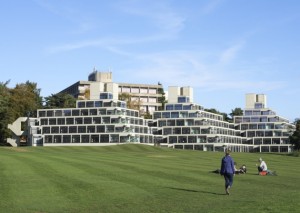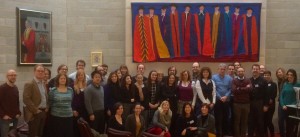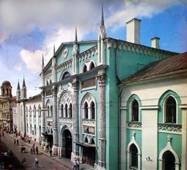DECEMBER, 2024 – New joint EU MSCA DN – UKRI funded grant commences – Spatial Communication and Ageing across Languages (SCALA).
Kenny is the scientific coordinator of a new joint MSCA-DN-UKRI doctoral network investigating spatial communication and ageing across languages. Across 16 projects, SCALA investigates spatial communication in typical and typical ageing across languages, and how one might develop tools to facilitate spatial communication for older adults. The project, jointly funded by the EU commission and UKRI, is jointly coordinated by Chris Kray (EU coordinator, University of Muenster, Germany) and Kenny (scientific coordinator).
OCTOBER, 2023 – New article published in Nature Human Behaviour shows (universal) action constraints on demonstrative systems
Kenny and colleagues, many from the DCOMM consortium, report the results of a large-scale experiment across speakers of 29 diverse languages, showing, among other findings, that all tested languages have a demonstrative mapping onto reachable space and another that maps onto non-reachable space. The article is available here: https://www.nature.com/articles/s41562-023-01697-4
OCTOBER, 2023 – Conference in Porto
Kenny attends the Advances in the Study of language Development and Literacy Learning in the Digital Age conference in Porto. This was the final conference for the e-LADDA network, and was a fitting end to this grant, with the ESRs giving talks shows all the progress made during the grant.
APRIL 2023 – E-LADDA Workshop in Amsterdam
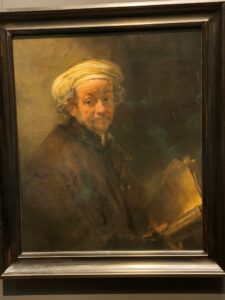 Kenny attends the e-LADDA workshop in Amsterdam, organised by colleagues in Free University Amsterdam. Time for visits to the Rijksmuseum and a bike tour in Haarlem between sessions.
Kenny attends the e-LADDA workshop in Amsterdam, organised by colleagues in Free University Amsterdam. Time for visits to the Rijksmuseum and a bike tour in Haarlem between sessions.
JANUARY 2023 – Visit to Utrecht University, the Netherlands
 Kenny gives a Helmholtz talk at the Helmholtz Institute. Great to meet so many exciting researchers in the Department of Experimental Psychology, and to see a packed room full of researchers post-covid!
Kenny gives a Helmholtz talk at the Helmholtz Institute. Great to meet so many exciting researchers in the Department of Experimental Psychology, and to see a packed room full of researchers post-covid!
DECEMBER 2022 – Kenny attends workshops in Bremen and Goettingen
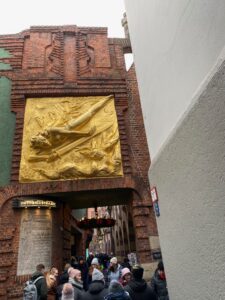 Kenny attends workshops in Bremen and Goettingen related to the e-LADDA grant.
Kenny attends workshops in Bremen and Goettingen related to the e-LADDA grant.
SEPTEMBER 2021 – Kenny attends his first ‘in person’ conference since the onset of COVID-19
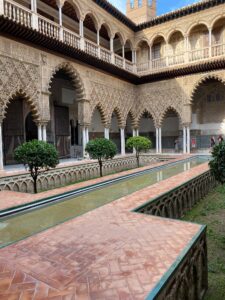 The e-LADDA Conference 21: Understanding Language and Literacy Development in the Digital Age, takes place in Seville. Terrific to meet the Early Stage Researchers in person on the EU e-LADDA grant, and to get together with the other PIs.
The e-LADDA Conference 21: Understanding Language and Literacy Development in the Digital Age, takes place in Seville. Terrific to meet the Early Stage Researchers in person on the EU e-LADDA grant, and to get together with the other PIs.
AUGUST 2021 – After 9 years as Head of the School of Psychology at UEA, Kenny begins a year of study leave to focus on research full time
After serving two terms as Head of the School of Psychology at the University of East Anglia, Kenny hands over the reins to Professor Neil Cooper. Kenny will be on study leave, focussing on research full time, until September 2022.
JANUARY 2020 – Back at Hanse-Wissenschaftskolleg working on object-location memory (fMRI studies) at Bremen University
A return visit to the HWK as a “twin” fellow aims to reveal the neural correlates of object-location memory and object ownership. A series of fMRI studies Kenny is conducting in collaboration with Harmen Gudde, Will Penny, Irene Sperandio (UEA) and Peter Erhard and Manfred Herrman (Bremen) examine how knowledge of objects affects memory for where objects are located (trying to unpack the networks underlying the behavioural results reported in earlier studies; Coventry, Griffiths & Hamilton, 2014).
NOVEMBER 2019 – Kenny attends kick-off meeting for a new grant examining language acquisition in the digital age
 Kenny travels to Norway for the first “e-LADDA” meeting – a new 3.82 million euro EU MSCA ETN grant examining Language Acquisition in the Digital Age. The research programme will run for four years across seven different countries, coordinated by Mila Vulchanova at NTNU. The main goal is to examine how digital technology impacts upon language learning. Kenny’s research contributions will examine how different forms of language learning via mobile phone platforms affect how the brain represents language following learning. More information on e-LADDA is here.
Kenny travels to Norway for the first “e-LADDA” meeting – a new 3.82 million euro EU MSCA ETN grant examining Language Acquisition in the Digital Age. The research programme will run for four years across seven different countries, coordinated by Mila Vulchanova at NTNU. The main goal is to examine how digital technology impacts upon language learning. Kenny’s research contributions will examine how different forms of language learning via mobile phone platforms affect how the brain represents language following learning. More information on e-LADDA is here.
SEPTEMBER 2019 – In Glasgow to celebrate the research achievements of Simon Garrod
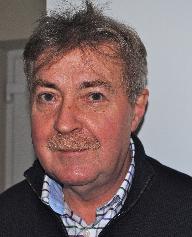
 Kenny is thrilled to be back at Glasgow University to celebrate the outstanding research career and enduring scientific contributions of Simon Garrod, who has just retired. At “Simonschrift”, Kenny talked about research on language and space since the publication of Saying, Seeing and Acting, coauthored with Simon in 2004. Other speakers at the event included Martin Pickering (University of Edinburgh), Nicolas Fay (University of Western Australia) and other collaborators, colleagues and former students of Simon. Congratulations, Simon, on an outstanding career!
Kenny is thrilled to be back at Glasgow University to celebrate the outstanding research career and enduring scientific contributions of Simon Garrod, who has just retired. At “Simonschrift”, Kenny talked about research on language and space since the publication of Saying, Seeing and Acting, coauthored with Simon in 2004. Other speakers at the event included Martin Pickering (University of Edinburgh), Nicolas Fay (University of Western Australia) and other collaborators, colleagues and former students of Simon. Congratulations, Simon, on an outstanding career!
JULY 2019 – New DCOMM Film Showcasing Work on Deictic Communication is Produced in Norwich
New film showcasing the work done by the early stage researchers on the DCOMM grant is now available to view here.
JULY 2019 – Deictic Communication Conference in Norwich
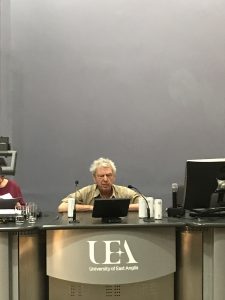 Kenny hosts the Deictic Communication – Theory and Application Conference in Norwich, with keynote addresses from Leonard Talmy (University of Buffalo, USA; pictured) and Anna Borghi (Sapienza University of Rome and CNR, Italy). The conference programme can be found here.
Kenny hosts the Deictic Communication – Theory and Application Conference in Norwich, with keynote addresses from Leonard Talmy (University of Buffalo, USA; pictured) and Anna Borghi (Sapienza University of Rome and CNR, Italy). The conference programme can be found here.
MARCH 2019 – Plenary address in Moscow
Kenny travels to Moscow to give an invited talk on Language and the Visual World at the International Conference on Challenges of the XXI century event – a possible answer from cognitive sciences, organised by the Russian State University of the Humanities.
OCTOBER 2018 – DCOMM Training Event in Jena
Friedrich-Schiller-Universität Jena hosts the third DCOMM Training School on dissemination and academic skills, hosted by Holger Diessel. Great to see the Early Stage Researchers generating exciting data and publishing their work.
OCTOBER 2018 – Visit to Torino, Italy to Forge New Collaborations
Kenny gives a talk at the University of Turin and forges new collaborations with Raffaella Ricci and Anna Berti, new @DCOMM_EU partners with Michela Caldano. New studies will examine language and visual neglect.
AUGUST 2018 – DCOMM Event in Trondheim plus Workshop
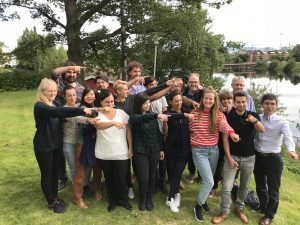 NTNU hosts the third DCOMM Training School on Individual Differences in Deictic Communication, followed by the Attentive Listener in the Visual World 2018 Workshop, with Keynote addresses given by Kenny, Fernanda Ferreira (UC Davis), Inge-Marie Eigsti (UConn) and Jim Magnuson (UConn).
NTNU hosts the third DCOMM Training School on Individual Differences in Deictic Communication, followed by the Attentive Listener in the Visual World 2018 Workshop, with Keynote addresses given by Kenny, Fernanda Ferreira (UC Davis), Inge-Marie Eigsti (UConn) and Jim Magnuson (UConn).
JUNE 2018 – Visit to Latvia
A Topology, Geometry and Function workshop takes place at the University of Latvia in Riga, organised by Prof. Jurgis Skilters, with Kenny contributing opening and closing keynote addresses. Kenny was also invited to the British Embassy to meet the British Ambassador, Keith Shannon, to discuss research links between the UK and Baltic countries, and to make a short film about his research.
MARCH 2018 – DCOMM Workshop in Münster
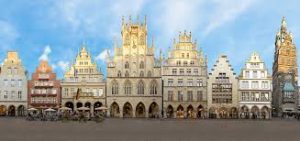 Back in Münster as IFGI at WWU hosts the DCOMM workshop on Advanced Technologies 2 for Deictic communication, with sessions on motion tracking, Virtual Reality, and future funding opportunities.
Back in Münster as IFGI at WWU hosts the DCOMM workshop on Advanced Technologies 2 for Deictic communication, with sessions on motion tracking, Virtual Reality, and future funding opportunities.
FEBRUARY 2018 – AMMA2050 Project Meeting in Montpelier
Kenny gives an invited talk with Jordan Harold to the AMMA2050 annual project meeting in Montpelier, France, covering the work they are doing with AMMA2050 and FRACTAL (and Irene Lorenzoni at UEA) on improving the communication of uncertainty about climate change in West Africa (funded by Future Climate for Africa fund). The talk title is “The psychology of uncertainty: developing insights for communicating climate science“. AMMA2050 focuses on the integration of scientific knowledge on climate change into planning and management structure in West Africa.
DECEMBER 2017 – Workshop in Trondheim
 Kenny gives a keynote address at a Spatial Language and Spatial Cognition Workshop, hosted by NTNU in a very Christmassy-looking Trondheim. Other keynotes are Barbara Landau (Johns Hopkins), Albert Postma (Utrecht) and Christian Doeller (Kavli Institute).
Kenny gives a keynote address at a Spatial Language and Spatial Cognition Workshop, hosted by NTNU in a very Christmassy-looking Trondheim. Other keynotes are Barbara Landau (Johns Hopkins), Albert Postma (Utrecht) and Christian Doeller (Kavli Institute).
NOVEMBER 2017 – DCOMM training event in Zurich
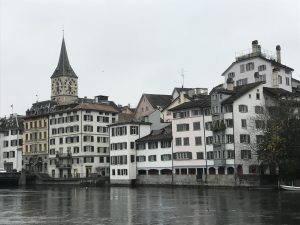 ETH Zurich hosts the DCOMM training event focusing on gesture in architectural design and entrepreneurship, with presentations from KCAP, Google and Faculty from ETH.
ETH Zurich hosts the DCOMM training event focusing on gesture in architectural design and entrepreneurship, with presentations from KCAP, Google and Faculty from ETH.
OCTOBER 2017 – DCOMM Mid Term Review Meeting takes place in Palma
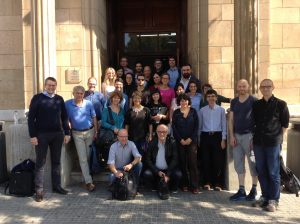 All Early Stages Researchers and PIs gave presentations to the project officer and evaluator showcasing the research conducted on deictic communication by DCOMM researchers so far. Inspiring to see just how far the ESRs have come in a relatively short space of time.
All Early Stages Researchers and PIs gave presentations to the project officer and evaluator showcasing the research conducted on deictic communication by DCOMM researchers so far. Inspiring to see just how far the ESRs have come in a relatively short space of time.
JUNE 2017 – Language as a Form of Action Conference takes place at CNR in Rome.

Over 200 people attended, co-funded by DComm. A special DComm poster session showcased ESR work from around Europe.
JUNE 2017 – The 2017 LingPhil Summer School takes place in Voksenåsen, Oslo Norway.
Kenny contributes a few sessions on the psychological semantics of quantifiers. 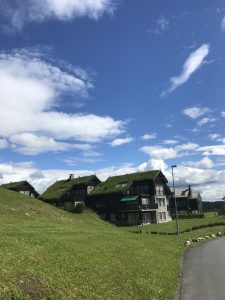
MAY 2017 – What will virtual reality do to our brains?

Interview with Kenny in the Gadget Show Guide Magazine explores the science of Virtual Reality. Read an abridged version of the article here.
APRIL 2017 – Kenny travels to Genoa to the Istituto Italiano di Tecnologia.
The third DCOMM event is hosted by IIT, on Advanced technologies for deictic communication. For more information please visit the DCOMM website here.
MARCH 2017 – Kenny travels to Palma Mallorca to take up a visiting Professorship position.
He will spend two months working with Pedro Guijarro-Fuentes and colleagues in linguistics at the University of the Balearic Islands focussing on deictic communication and second language acquisition.
FEBRUARY 2017 – New comment piece in ENDS Report considers climate change communication in post-truth era.
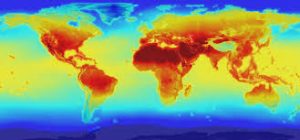 Read the piece here.
Read the piece here.
JANUARY 2017 – The second MSCA DCOMM European Training Network event takes place in Aarhus, Denmark, focussing on theoretical aspects of deictic communication.
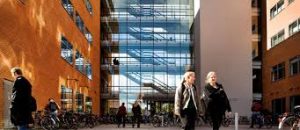 The event featured talks by Marianne Gullberg (Lund University) and Ulf Liszkowski (Hamburg University), with Kenny and other DCOMM PIs also contributing. More information can be found on the DCOMM website here.
The event featured talks by Marianne Gullberg (Lund University) and Ulf Liszkowski (Hamburg University), with Kenny and other DCOMM PIs also contributing. More information can be found on the DCOMM website here.
DECEMBER 2016 – Kenny travels to Trondheim to give a talk in celebration of 10 years of the world’s Northernmost psycholinguistics and neurolinguistics lab.
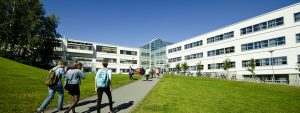 Congratulations to Mila Vulchanova and colleagues on the 10th anniversary of the Language Acquisition and Language Processing Lab at NTNU (https://www.ntnu.edu/langdevlab).
Congratulations to Mila Vulchanova and colleagues on the 10th anniversary of the Language Acquisition and Language Processing Lab at NTNU (https://www.ntnu.edu/langdevlab).
NOVEMBER 2016 – New paper in Nature Climate Change presents guidelines to make the visual representation of scientific data more accessible to both expert and non-expert audiences.
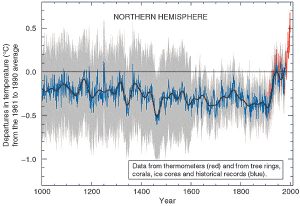 The paper, available here synthesises key findings from the cognitive and psychological sciences to present a set of 11 guidelines that can be used by experts in any scientific discipline to displays graphics, such as figures and diagrams, more effectively. Using IPCC graphics as a case study, we show how applying the guidelines leads to improved understanding of the scientific findings graphics are trying to convey. This research represents part of a collaboration between psychologists and climate scientists at UEA, together with the Spatial Learning and Intelligence Centre in the US. Our hope is that such guidelines might aid the scientific community to communicate their findings with maximum effectiveness to a wide range of audiences, including the general public.
The paper, available here synthesises key findings from the cognitive and psychological sciences to present a set of 11 guidelines that can be used by experts in any scientific discipline to displays graphics, such as figures and diagrams, more effectively. Using IPCC graphics as a case study, we show how applying the guidelines leads to improved understanding of the scientific findings graphics are trying to convey. This research represents part of a collaboration between psychologists and climate scientists at UEA, together with the Spatial Learning and Intelligence Centre in the US. Our hope is that such guidelines might aid the scientific community to communicate their findings with maximum effectiveness to a wide range of audiences, including the general public.
NOVEMBER 2016 – Finally Kenny becomes a member of the twitterati.
Follow him: @KennyCoventry
NOVEMBER 2016 – Communicating Climate Change workshop takes place in London.
The workshop brought together psychologists. cognitive scientists, climate scientists and and policy makers with the goal of discussing how to enhance the accessibility of climate change evidence. Visit the workshop pages here.
OCTOBER 2016 – The first MSCA DCOMM European Training Network event takes place in Palma, Mallorca.
DComm brings together the 13 Early Stage Researchers and PIs from across Europe for the first time, exploring a range of methodological approaches to deictic communication.
JULY 2016 – Kenny travels to Bangor, Wales to give Plenary address at the 6th UK Cognitive Linguistics Conference.
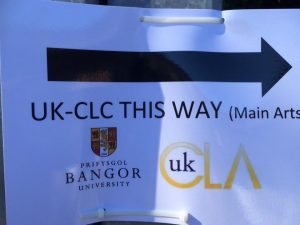
 More information about the conference can be found here.
More information about the conference can be found here.
JUNE 2016 – Keynote address at the Language and Perception International Conference in Norway.
The conference programme can be viewed here.
FEBRUARY 2016 – Marie Sklodowska Curie European Training Network on Deictic Communication (DCOMM) commences.
The new grant coordinated by Kenny at UEA has now begun. Check out the press release here. And please visit the DCOMM website here.
OCTOBER 2015 – Celebrating 3 years at the University of East Anglia.
Three years have flown past at UEA since the School of Psychology formally opened – the newest School of Psychology in a research-intensive university in the UK. Check out the most recent news and events from the School here.
SEPTEMBER 2015 – Winner of the 2015 British Psychological Society Cognitive Prize.
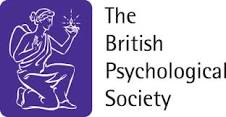 The BPS Cognitive Psychology Section Award recognises outstanding published contributions to research in the area of Cognitive Psychology. Eligible publications (covered the years 2013 and 2014 for the 2015 prize) are limited to scientific journal papers published reporting novel observations and providing significant theoretical insight into human cognition. The Award Panel gives greater consideration to studies with broad appeal and widespread implications, particularly studies that address longstanding problems and that advance conceptual understanding in unexpected or counterintuitive ways.
The BPS Cognitive Psychology Section Award recognises outstanding published contributions to research in the area of Cognitive Psychology. Eligible publications (covered the years 2013 and 2014 for the 2015 prize) are limited to scientific journal papers published reporting novel observations and providing significant theoretical insight into human cognition. The Award Panel gives greater consideration to studies with broad appeal and widespread implications, particularly studies that address longstanding problems and that advance conceptual understanding in unexpected or counterintuitive ways.
Kenny won the award for his paper (coauthored with Debbie Griffiths and Colin Hamilton) entitled Spatial demonstratives and perceptual space. The paper can be read and downloaded here.
He presented the prize-winning keynote address at the Cognitive Psychology Annual Conference at Kent in September 2015. More information about the prize can be found here.
AUGUST 2015 – New grant announcement: Kenny to coordinate a new 3.46 million Marie Sklodowska Curie European Training Network on Deictic Communication (DCOMM), commencing in February 2016 (for four years).
 DCOMM ABSTRACT: Deictic communication is fundamental to understanding communication in both typical and atypical populations, and forms the key connection between language and objects/locations in the world. It is therefore critical to understanding human-human interaction, and human-system interaction in a range of technology applications – from mobile phones to cognitive robotics – and to the enhancement of clinical and educational interventions with typical and atypical populations. This ETN will train the next generation of scientists in the full range of multidisciplinary and cross-sectorial methods necessary to make significant progress in understanding deictic communication, with direct synergies between basic research and application. Training is structured around two interdisciplinary research themes – Understanding Deictic Communication and Deictic Communication in Application – both involving extensive and systematic co-supervision and collaboration across sites with key interplay between academic and nonacademic beneficiaries and partners. In turn we expect that a range of applications will be enhanced with increased usability, with associated societal and economic benefit. The training of the cohort of ESR fellows is based on innovative PhD training approaches, providing not only training in interdisciplinary methods, but also employing peer-assisted methods and the latest in educational innovation. This will produce a cohort of highly skilled researchers who will be highly employable given the potential contribution they will make to future research and innovation in the public and private sectors.
DCOMM ABSTRACT: Deictic communication is fundamental to understanding communication in both typical and atypical populations, and forms the key connection between language and objects/locations in the world. It is therefore critical to understanding human-human interaction, and human-system interaction in a range of technology applications – from mobile phones to cognitive robotics – and to the enhancement of clinical and educational interventions with typical and atypical populations. This ETN will train the next generation of scientists in the full range of multidisciplinary and cross-sectorial methods necessary to make significant progress in understanding deictic communication, with direct synergies between basic research and application. Training is structured around two interdisciplinary research themes – Understanding Deictic Communication and Deictic Communication in Application – both involving extensive and systematic co-supervision and collaboration across sites with key interplay between academic and nonacademic beneficiaries and partners. In turn we expect that a range of applications will be enhanced with increased usability, with associated societal and economic benefit. The training of the cohort of ESR fellows is based on innovative PhD training approaches, providing not only training in interdisciplinary methods, but also employing peer-assisted methods and the latest in educational innovation. This will produce a cohort of highly skilled researchers who will be highly employable given the potential contribution they will make to future research and innovation in the public and private sectors.
The project announcement, with a full list of academic colloborators and fellow beneficiaries across Europe, can be found here.
AUGUST 2015 – Keynote address on Spatial demonstratives and perceptual space at the 5th Conference of the Scandinavian Association for Language and Cognition, held in Trondheim, Norway.
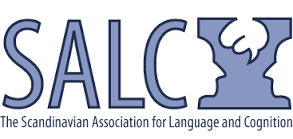 The conference programme can be viewed here.
The conference programme can be viewed here.
JULY 2015 – Presentation at the UEA Climate Change Research day 2015 highlights the need for interdisciplinary science.
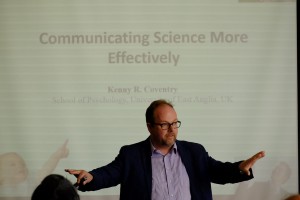 It is important that climate change scientists and cognitive and psychological scientists work together to facilitate the effective communication of climate change data to decision makers and the general public. UEA is spearheading efforts to do this, and this research day was a showcase for discussion of communicating big data in this domain.
It is important that climate change scientists and cognitive and psychological scientists work together to facilitate the effective communication of climate change data to decision makers and the general public. UEA is spearheading efforts to do this, and this research day was a showcase for discussion of communicating big data in this domain.
JULY 2015 – Keynote address at the British Machine Vision Association Workshop on Context Aware Cognitive Systems at the British Computer Association in London.
The programme can be viewed here.
FEBRUARY 2015 – Kenny hosts Lanpercept workshop and training school on Language and Perception: Theoretical Foundations and Connections.
The keynote speakers were Barbara Landau (Johns Hopkins, USA), Rolf Zwaan (Erasmus University Rotterdam) and Gabriella Vigliocco (University College London), with participants from all over the world. The event was held in the historic Council House at the University of East Anglia.
JANUARY 2015 – Invited talk on Spatial language and perceptual space at the Diagrams in Language Winter Symposium, Aarhus, Denmark.
 Information about the event is here.
Information about the event is here.
SEPTEMBER 2014 – Opening address at the Workshop on Spatial Language Modules, held at the Hanse Wissenschaftskolleg, Germany.
Information about the event can be found here.
JANUARY 2014 – Understanding Dyadic Interaction doctoral training event hosted by Kenny at UEA.
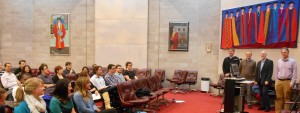 The event brought together leading speakers from across the UK approaching dyadic interaction from a range of different perspectives (from left to right): Lynden Miles (University of Aberdeen), Andrew Bayliss (UEA), Neil Cooper (UEA), Martin Pickering (University of Edinburgh) and Daniel Richardson (University College London, out of shot).
The event brought together leading speakers from across the UK approaching dyadic interaction from a range of different perspectives (from left to right): Lynden Miles (University of Aberdeen), Andrew Bayliss (UEA), Neil Cooper (UEA), Martin Pickering (University of Edinburgh) and Daniel Richardson (University College London, out of shot).
DECEMBER 2013 – New paper on spatial demonstratives and perceptual space accepted in Cognitive Psychology.
The paper, coauthored with Debbie Griffiths (UEA) and Colin Hamilton (Northumbria University Newcastle), presents the results of seven experiments systematically testing the influence of distance, and object properties – ownership, visibility, familiarity – on both demonstrative choice (this versus that) and memory for object location. The work emanated from an ESRC grant awarded to Coventry and Hamilton that was rated outstanding in final evaluation.
The paper can be read and downloaded here.
JANUARY 2013 – New Marie Curie ITN grant commences, value 4.2 million Euros, awarded to Kenny and colleagues across Europe.
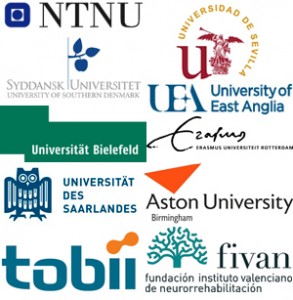 Language and Perception (Lanpercept) is a unique collaborative approach to understanding the interaction between two central cognitive systems: language and perception, and will run until 2016. Coordinated by Professor Mila Vulchanova (NTNU, Norway), with Kenny as PI at the University of East Anglia and further PIs across Europe, the grant will train the next generation of scientists on the mapping of language and perception across the lifespan in both healthy and atypical populations, in theoretical approaches to the relationship between language and perception, and in the development of new technologies to further understand the mapping between them.
Language and Perception (Lanpercept) is a unique collaborative approach to understanding the interaction between two central cognitive systems: language and perception, and will run until 2016. Coordinated by Professor Mila Vulchanova (NTNU, Norway), with Kenny as PI at the University of East Anglia and further PIs across Europe, the grant will train the next generation of scientists on the mapping of language and perception across the lifespan in both healthy and atypical populations, in theoretical approaches to the relationship between language and perception, and in the development of new technologies to further understand the mapping between them.
Visit the grant website here.
OCTOBER 2012 – Kenny moves to the University of East Anglia to take up the post of Chair in Psychology and Inaugural Head of the School of Psychology.
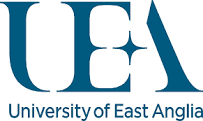 The School of Psychology website can be found here.
The School of Psychology website can be found here.
AUGUST 2012 – The Embodied and Situated Language Processing Conference (ESLP2012) comes to Newcastle.
 Hosted by the Cognition and Communication Research Centre and chaired by Kenny, Larry Taylor and Paul Engelhardt, the conference page and programme can be browsed here.
Hosted by the Cognition and Communication Research Centre and chaired by Kenny, Larry Taylor and Paul Engelhardt, the conference page and programme can be browsed here.
MARCH 2012 – Kenny gives a talk with Alastair Campbell (former advisor to British Prime Minister Tony Blair), on the science of decision making.
The event was organised by Newcastle Science City, and staged in association with the Newcastle Science Festival. Kenny talked about the science of decision making, and Alastair discussed the realities of decision making in government. The individual talks were followed by a joint question and answer session from the audience.
Laura Lord, Newcastle Science City said: “Both Kenny and Alastair went down a storm and I have heard nothing but positive comments about both presentations.”
Head of Newcastle City Library, where the talks took place, said “It was a real pleasure to see a full house at the Library enthralled by two very different, but wonderfully entertaining speakers.”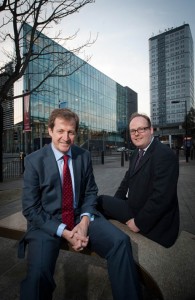
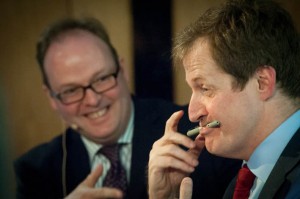
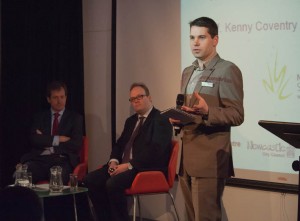
MARCH 2012 – Keynote address at the Conference on Interdisciplinarity in Cognitive Science Research, held at the Russian State University for the Humanities, Moscow.
MARCH 2012 – Kenny goes to Brussels to the European Parliament to attend a European Research Leadership in Robotics working lunch debate.
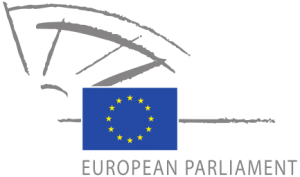 The debate, organised by Professor Ioannis A. Tsoukalas (MEP) and Professor Angelo Cangelosi (Plymouth University), brings together European and US scientists, industry experts, and representatives of the European Institutions to explore the state of the art in robotics research and discuss future R&D challenges and plans to sustain European leadership in this field.
The debate, organised by Professor Ioannis A. Tsoukalas (MEP) and Professor Angelo Cangelosi (Plymouth University), brings together European and US scientists, industry experts, and representatives of the European Institutions to explore the state of the art in robotics research and discuss future R&D challenges and plans to sustain European leadership in this field.
DECEMBER 2011 – New film funded by the Economic and Social Research Council showcases work on language and perception, featuring work on spatial demonstratives and perceptual space.
 View the film here.
View the film here.

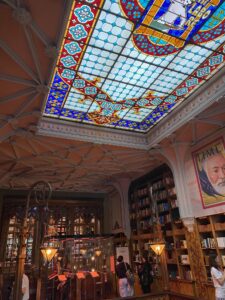
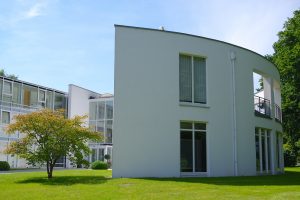
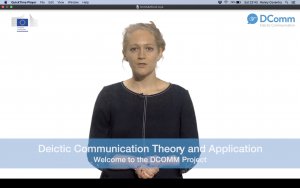

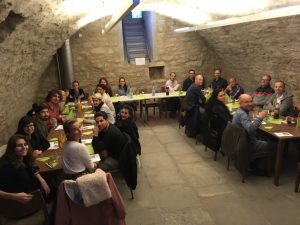
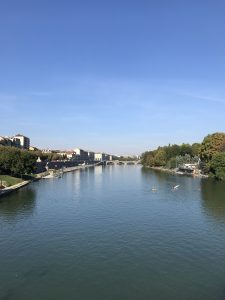
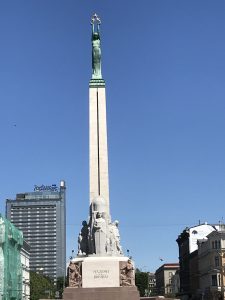
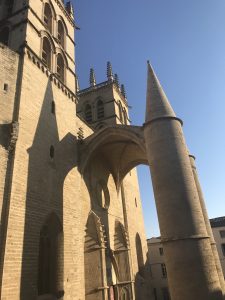
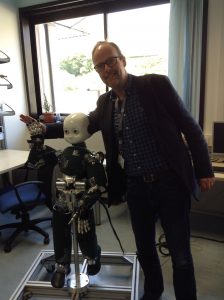
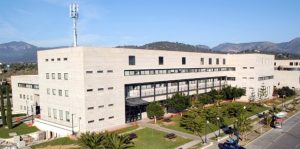

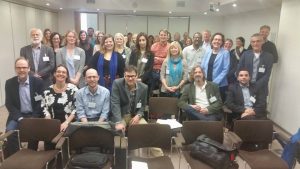
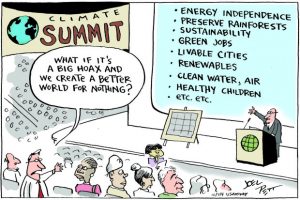
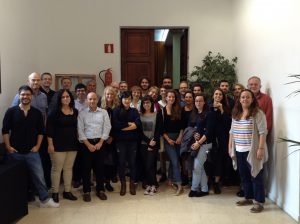

![DComm-logo-Cyan[1] copy](http://www.kennycoventry.org/wordpress/wp-content/uploads/2015/12/DComm-logo-Cyan1-copy-300x81.png)
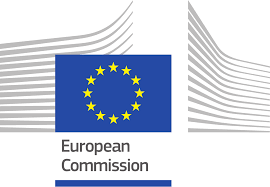
![Partners logos combined[1]](http://www.kennycoventry.org/wordpress/wp-content/uploads/2016/05/Partners-logos-combined1-300x166.jpg)
